There is nothing more rewarding than staying hale and hearty. This is perhaps the best gift that we can give to our own body—taking good care of it by consuming only healthy foods and beverages.
Another way to take good care of it is to exercise once and a while to burn those unwanted fats.
And when working out, we need a little dose of energy to power up and enhance our mind and body, so we keep motivated before hitting the gym.
Energy drinks can be the key to this extra energy and extra boost that we need.
But what type of energy drinks exactly? Is it even safe to drink? When is the best time to drink energy drinks?
To take down those questions and curiosity, read further.
Contents
How Important is Working Out?

Working out, or exercise in general, is fairly significant and is recommended by most experts and nutritionists worldwide, helping to improve your stamina and endurance, as well as preventing any severe onsets of disease.
Burning a few pounds can be healthy and keeps you away from potential health risks, which may later be the cause of a particular chronic condition.
However, if you decide to neglect your body and your needs, you will most likely develop some metabolic condition; overweight or malnutrition.
The World Health Organization (WHO) cited millions and even billions of new cases of obesity and overweight for both children and adults.
Why arrive at this particular point when you can prevent it?
Working out improves your muscle strength, boosts your stamina and endurance. Physical activity is vital because It will lessen your risk of having a heart attack.
Significance of Caffeine in Working Out

Consumption of caffeinated beverages before working out is entirely viable. In addition, caffeine offers many excellent benefits when drinking in the right way and the right amount.
Caffeine is known worldwide as a stimulant. It is an ingredient that is commonly recognized to combat fatigue and drowsiness, but there are also other uses of caffeine apart from those mentioned, and these are:
- Caffeine improves cognitive performance.
- Enhance physical activity
- Burn Fats
- Boost Energy
- Increases metabolism functions
- Promotes Good Concentration
- Aids in athlete’s performance
- Decreases muscles pain
- Helps combat disease
When it comes to exercise, caffeine has been shown to be able to improve exercise performance as well as help reduce reaction times, which will definitely heighten what you get out of your workout overall.
How Much Caffeine Should You Take Pre-Workout?
Experts recommend a caffeine dose of about 200-400mg; however, it varies per body weight. This amount of caffeine should be taken 30-60 minutes before working out.
It is reasonably safe when consumed daily, but be careful of your caffeine intake as the FDA only recommended 400mg of caffeine max as a safe amount to be have daily.
Drinking more than 400mg of caffeine, or generally exceeding your personal caffeine tolerances, may lead to side effects such as::
- Caffeine toxicity
- Diarrhea
- Insomnia
- Difficulty of breathing
- Tremors
- Irregular Heartbeat
- Convulsions
- Chest pain
- Vomiting
- Fever
- Massive head
How Safe is an Energy Drink?
Drinking one or two energy drinks will unlikely cause any harm to your body. However, consuming in large amounts can.
Energy drinks contain calories, sugar, and caffeine, which may cause you some problems in the long-run
So, let’s break down each factor and see how bad are they when overconsumed.
Caffeine Content
Generally, energy drinks contain anywhere between 80mg to 300mg of caffeine, depending on the brand you partake in. While a single energy drink probably won’t cause any problems, having multiple cans, or going over your caffeine tolerance, can definitely be harmful.
400mg is the safe dose limit suggested by the FDA that will not cause any harm to your body, although depending on your BMI and metabolism, the value may vary,
So, drinking an energy drink is relatively safe so long as you stick to the recommended caffeine intake.
Overconsumption of caffeine is associated with severe heart and blood vessel problems, mental and heart disturbances, cardiovascular diseases, and other health issues mentioned above.
Sugar Content
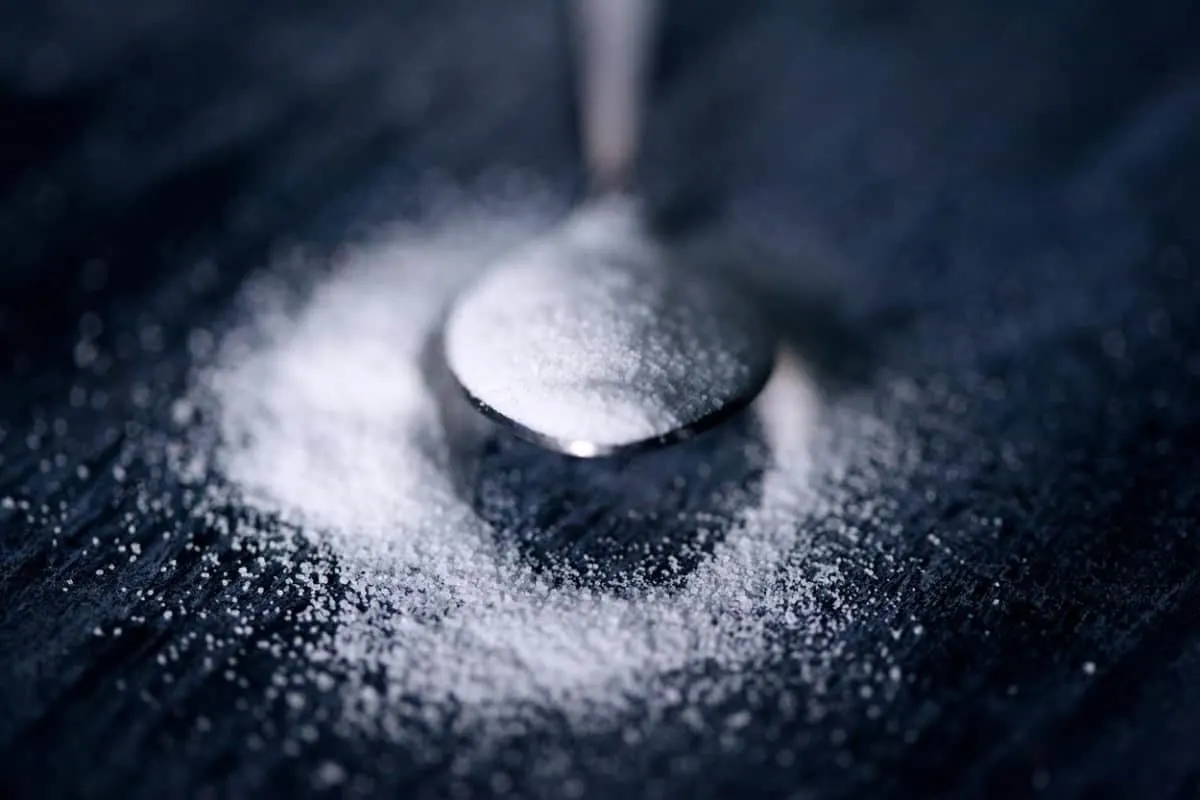
Most energy drinks have some amount of sugar to them (some to a ludicrous extent), but there are plenty of sugar-free energy drinks as well.
The American Heart Association (AHA) cited a daily sugar intake of 36g or nine teaspoons for men and 25g or roughly around six teaspoons for women.
However, suppose you have any health conditions like a person with diabetes. In that case, it is recommended to restrict your sugar intake, so as much as possible, drink an energy drink that has no sugar contents.
It is okay to drink energy drinks; be careful not to exceed the recommended limit.
Consistently exceeding your daily sugar intake may lead to the following:
- Weight gain
- Increase blood sugar
- Increase risk of heart disease
- Fatigue
- An unusual craving for more sweets
- Acne and wrinkles
- Joint and muscle pain
- Sleep issues
- Digestive issues
- Dental issues
Calorie Content
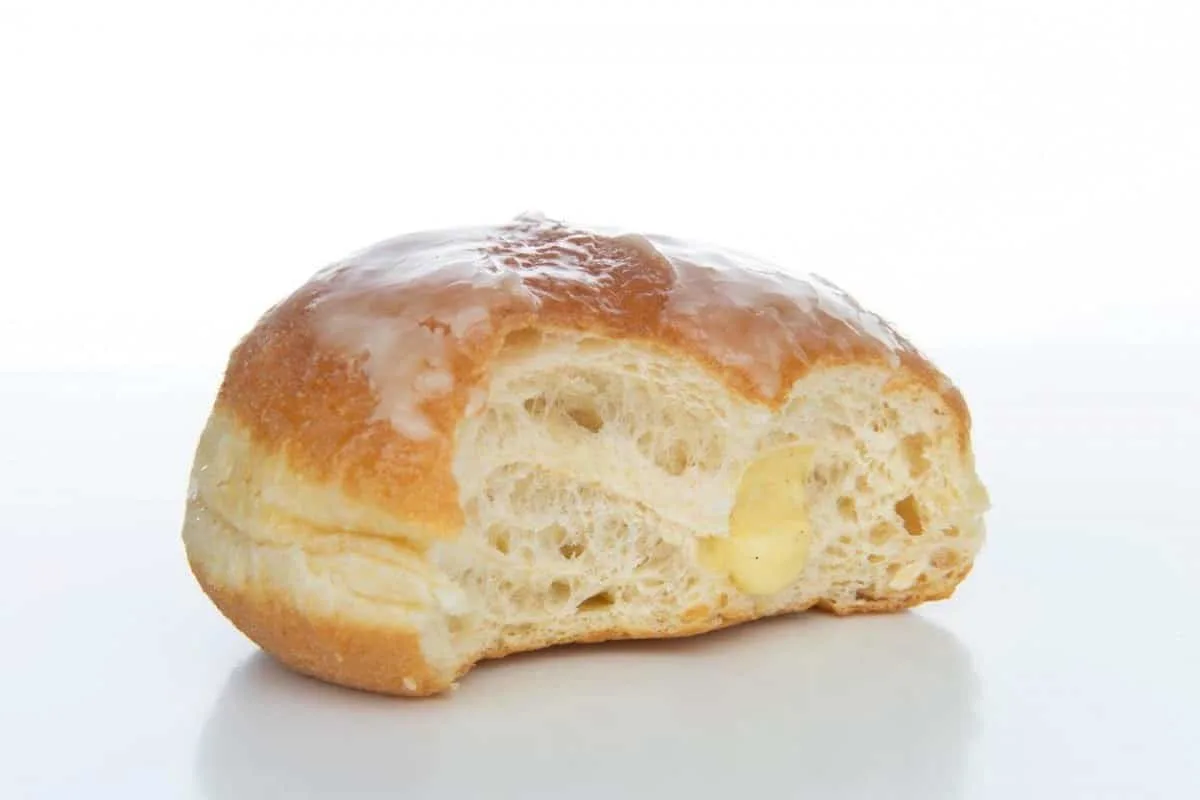
A calorie is a measurement of energy from the food and beverages that you eat.
The ideal daily calorie intake varies on age, metabolism, and physical activity. The recommended daily calorie intake is 2,000 calories for women and 2,500 for men.
Other brands or varieties of energy drinks contain only minimal calories. If you have underlying medical conditions, it is best to drink energy drinks with low-calorie content.
Exceeding more than the recommended limit will cause:
- High cholesterol level
- Unused calories will be deposited as fats
- Increase chances of obesity
- Increase risk for cancer
- increase developing potential chronic conditions
When is the Best Time to Drink? Energy Drinks
The International Society of Sports Nutrition (ISSN) concluded that drinking energy drinks 10-60 minutes before working out can enhance mental functions, alertness, and endurance.
Other experts cited the exact time of when to drink energy drinks to regulate its effects:
Mid-morning
We know that energy drinks contain caffeine, so drinking it mid-morning, between 9:30 am – 11:30 am, will garner its highest efficacy.
Mid-afternoon
Drinking energy drink between 1:30 pm to 3:30 pm mid-afternoon as this is usually when our body starts to lose its energy and momentum and starts to crash due to the long, hard day at work. So, drinking an energy booster during this time will help regain the body’s most whole energy.
Pre-workout or During Workout?
In my opinion, energy drinks are best to take pre-workout to improve mental focus and physical function. However, make sure that you bring water with you as energy drinks tend to increase dehydration.
The American College of Sports Medicine (ACSM) recommends to have at least five to six milliliters of fluid per kilogram of body weight before working out.
If you are working out for more than one hour, or in a warm climate, the ACSM suggests to select a beverage which have a sodium content of 20 to 30meq/L, potassium of two to five meq/L, and carbohydrates with 5% to 10% for maximum hydration.
Can I Drink Red Bull Pre-Workout?
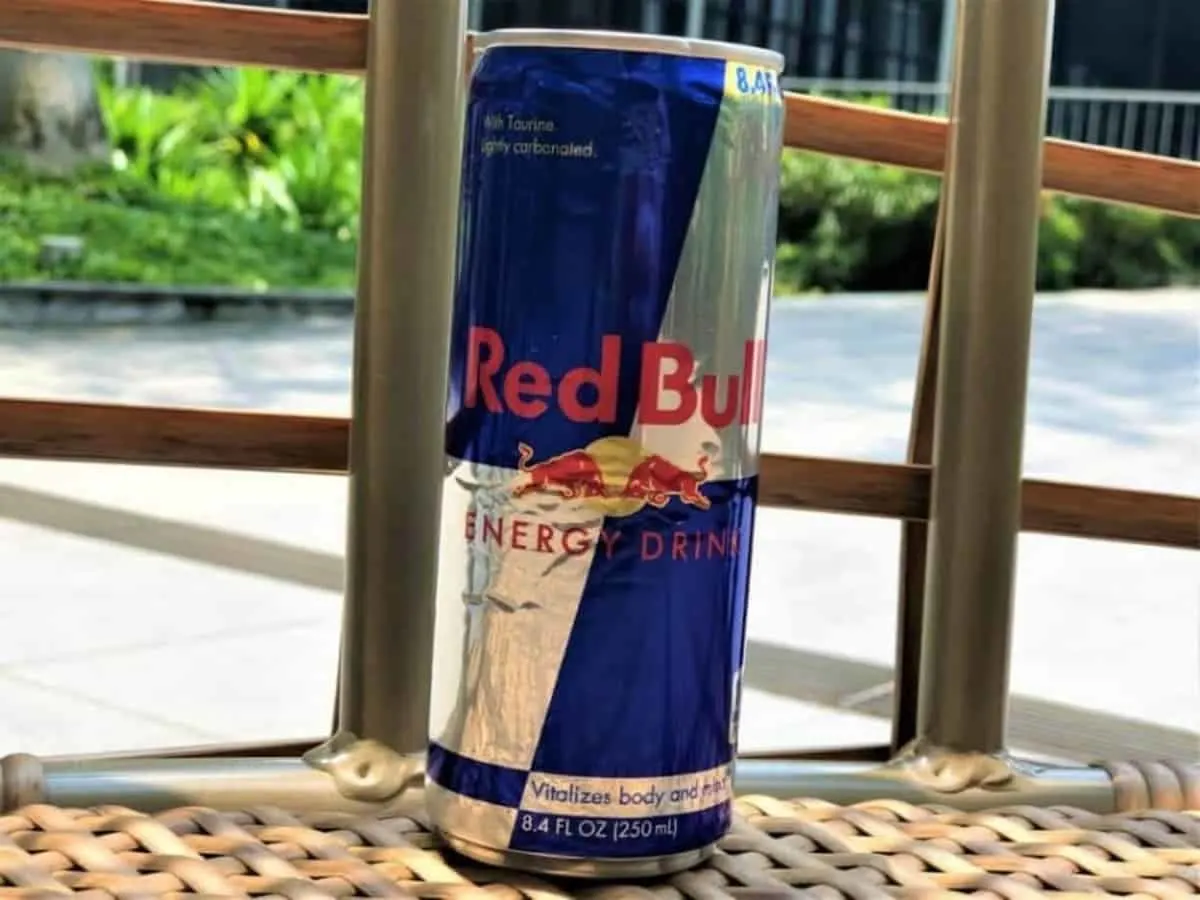
Yes, you can, the caffeine and sugar content can help to give you a bit of a boost before your workout, but be sure not to overdo it.
You can drink Red Bull before working out, but keep in mind that Red Bull Energy is not a thirst quencher type of drink. It is important that you drink water after Red Bull for ultimate hydration.
If you want to know more about Red Bull and how well it may suit you in general, have a look at my Red Bull Review article for an in-depth look at this classic energy drink.
Is energy drink good for workout?
Energy drinks are marketed as a way to boost energy and improve performance, but whether they are good for workouts or not depends on a number of factors.
Energy drinks typically contain high levels of caffeine, sugar, and other stimulants that can increase heart rate, blood pressure, and alertness. While these effects may be helpful for some people during a workout, they can also cause negative side effects like jitters, headaches, and insomnia.
Additionally, energy drinks are not a substitute for proper hydration, and may even contribute to dehydration due to their high sugar and caffeine content. Proper hydration is crucial for maintaining good performance during exercise, so it’s important to drink enough water or electrolyte beverages to stay hydrated.
Is Gatorade good for working out?
Gatorade can be a beneficial addition to a workout routine, especially during intense or prolonged exercise, but it should be consumed in moderation and balanced with a healthy diet and regular physical activity. It’s also important to stay hydrated by drinking enough water or other non-sugary fluids throughout the day.
It’s also important to note that Gatorade also contains added sugars, which can contribute to excess calorie consumption and potentially lead to weight gain if not balanced with physical activity and a healthy diet. Therefore, it’s important to consume Gatorade in moderation and ensure that it fits into your overall dietary plan and fitness goals.
Are preworkout drinks healthy?
Pre-workout drinks are dietary supplements that are designed to improve athletic performance by increasing energy, focus, and endurance. While some preworkout drinks may contain beneficial ingredients such as caffeine, amino acids, and creatine, it’s important to note that the safety and effectiveness of these supplements are not well-regulated by the FDA.
Therefore, while pre-workout drinks may provide a temporary boost in energy and performance, it’s important to be cautious when using them and to consult with a healthcare professional before incorporating them into your workout routine. It’s often better to focus on getting adequate nutrition from a balanced diet and staying properly hydrated to support optimal athletic performance.
Recommended Workout Energy Drinks
There are a number of energy drinks that are available in the market. Most are formulated to give you the boost that you need when working out.
The following are the most recommended pre-workout energy drink along with their caffeine, sugar, and calorie contents:
| ENERGY DRINK | CALORIES | SUGAR CONTENT | CAFFEINE CONTENT |
| Celsius (16 fl.oz) | 10 calories | 0g | 200mg |
| Bang Energy (16 fl.oz) | 0 calorie | 0g | 300mg |
| Monster Energy (16 fl.oz) | 210 calories | 54g | 160mg |
| Reign Energy (16 fl.oz) | 0-10 calories | 0g | 300mg |
Celsius Energy
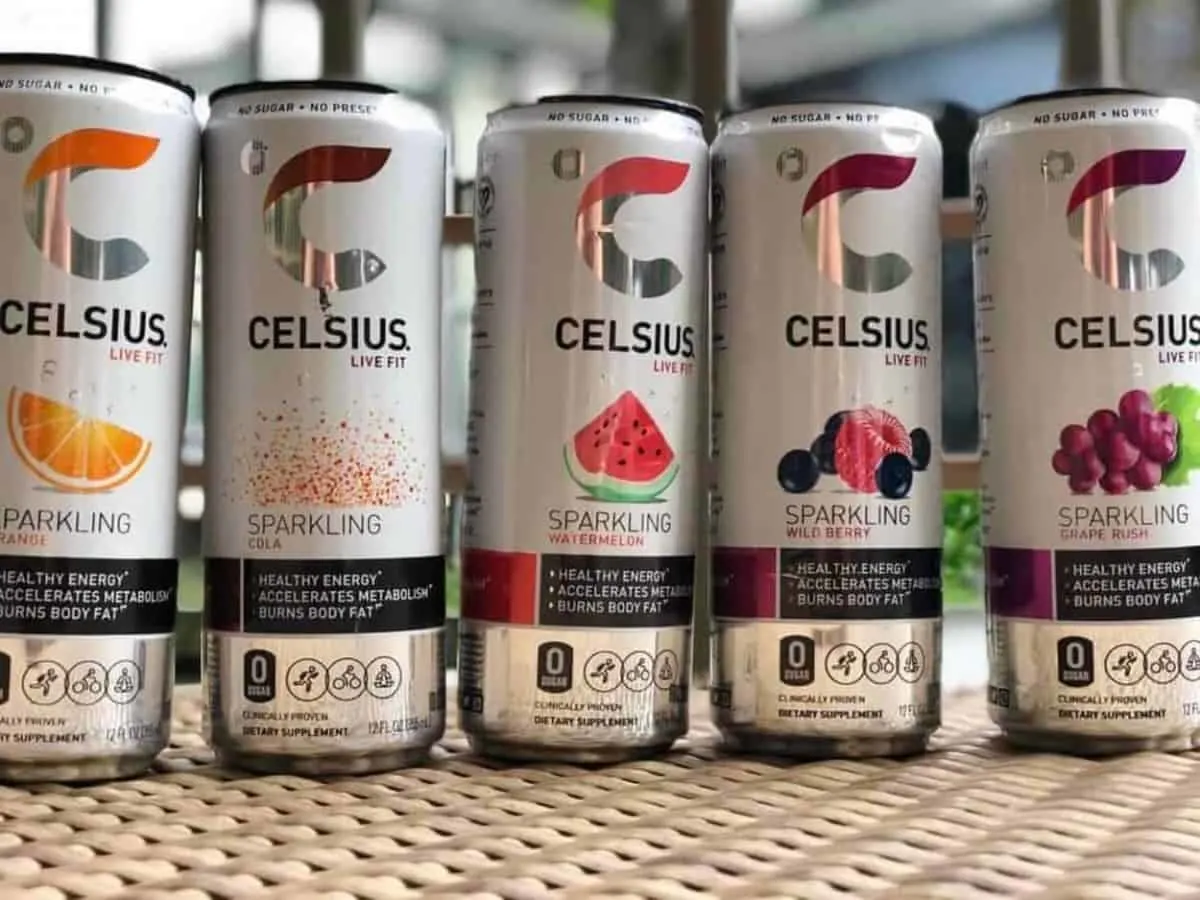
If you want something that’s heavier on the caffeine but light on the taste buds, Celsius can definitely give you the soda-like feel with the extra caffeination you crave.
Each 12 fl.oz can of Celsius has 200mg, 10 calories and no added sugar, making it a perfect companion for your workout routine. Celsius also claims to be able ‘accelerate metabolism’ and ‘burn body fat’, although the drink’s probably not going to do that without some actual exercise done by yourself.
For more on Celsius, head on over to my Does Celsius Actually Work article to find out more.
Bang Energy
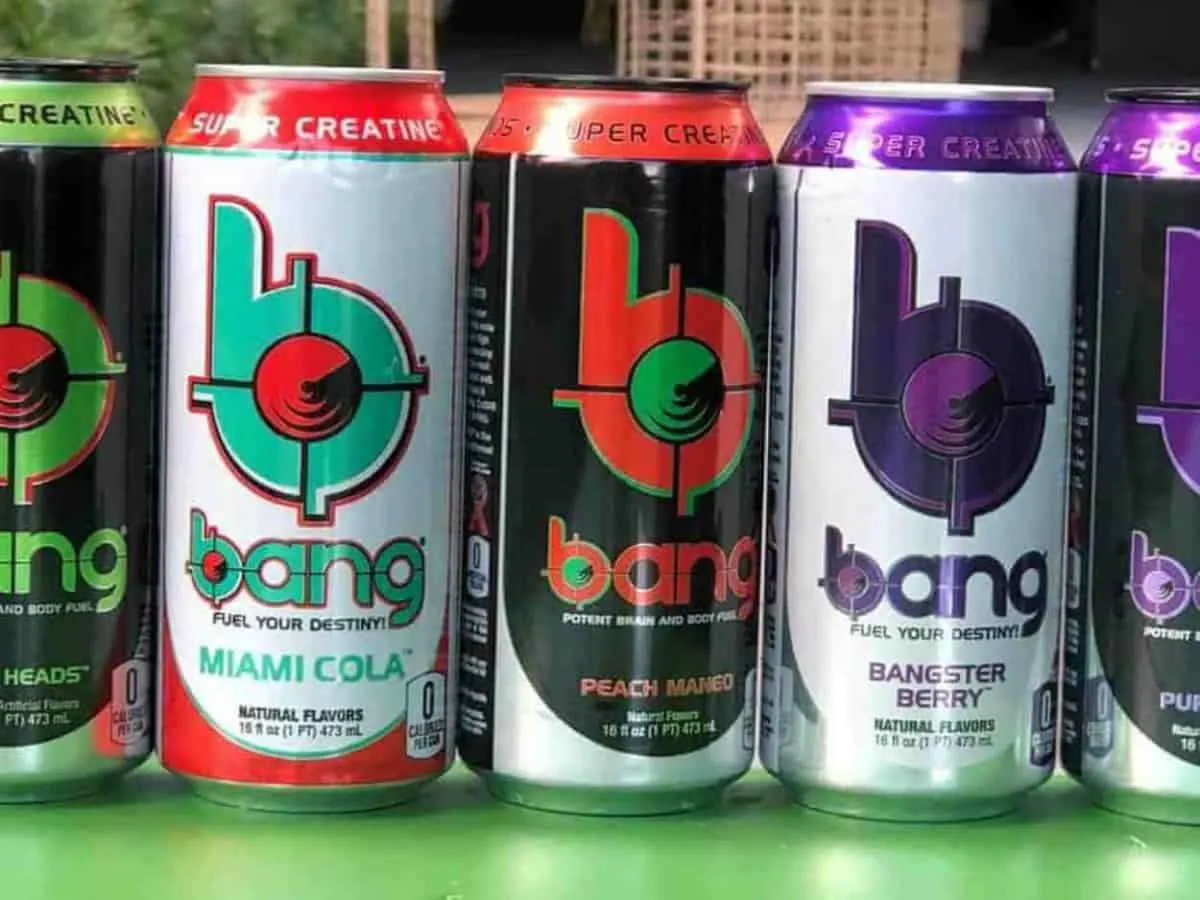
As a pre-workout beverage, Bang definitely works.
Bang contains a massive amount of caffeine that is 300mg, almost reaching the 400mg safe threshold set by the FDA.
Another good thing in Bang is that, it is formulated with zero-calorie and sugar-free. A friendly beverage for those who are losing weight and working out.
Bang Energy has 18 flavors, so you can choose any flavors that you want to drink. If you are into fruity and sweet taste without harming your weight, then you must try Bang Energy.
Monster Energy
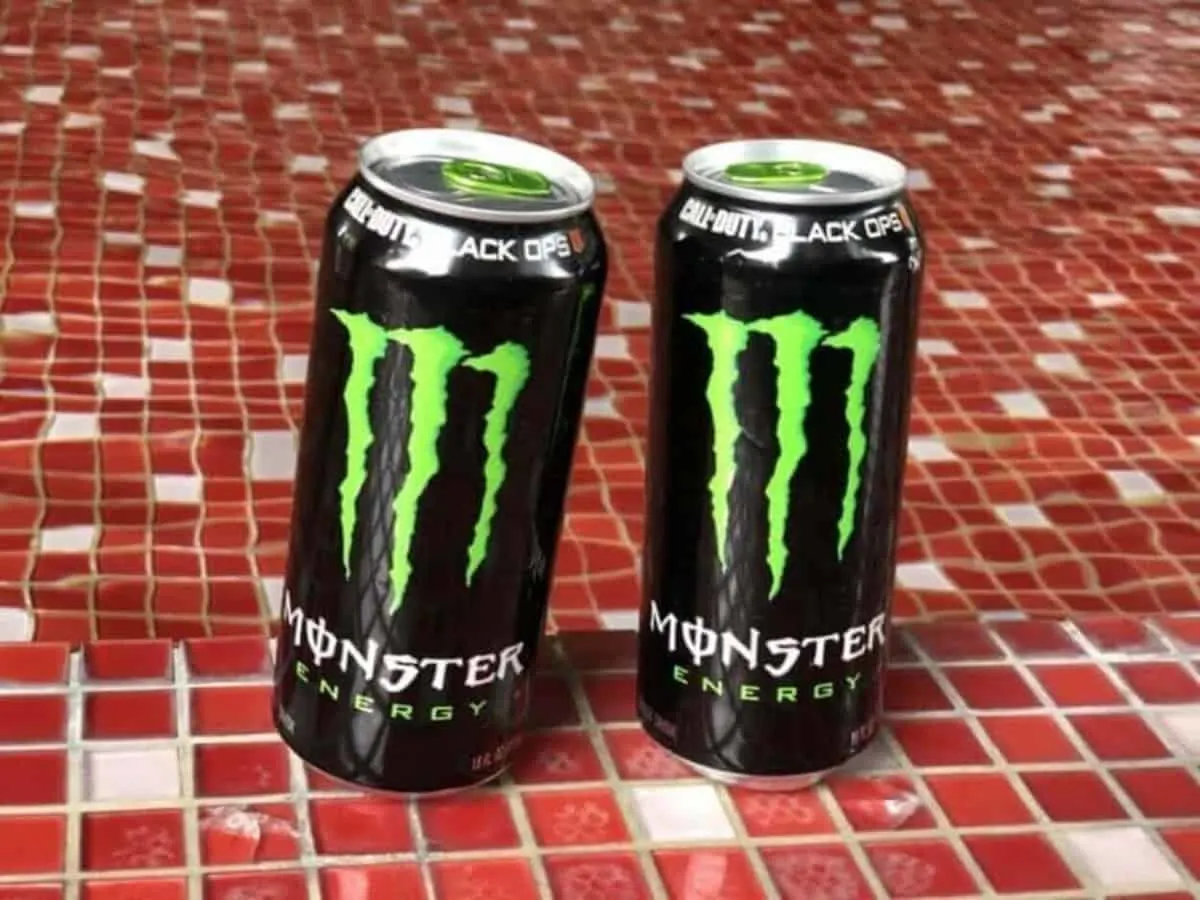
Monster Energy is another energy drink that can give you the extra energy boost that you need before working out.
According to experts, our body needs an average of 2,000 to 2,500 calories per day to aid in the daily functions and physical activities.
Monster contains 210 calories plus a 160mg of caffeine, both are enough to give you that quick boost you need during workout.
However, be mindful of your daily energy drink intake. Monster does have an absurd amount of sugar in it (54g per 16 fl.oz can to be exact), so you might want to reconsider if all that sugar is worth the rush.
Reign Energy
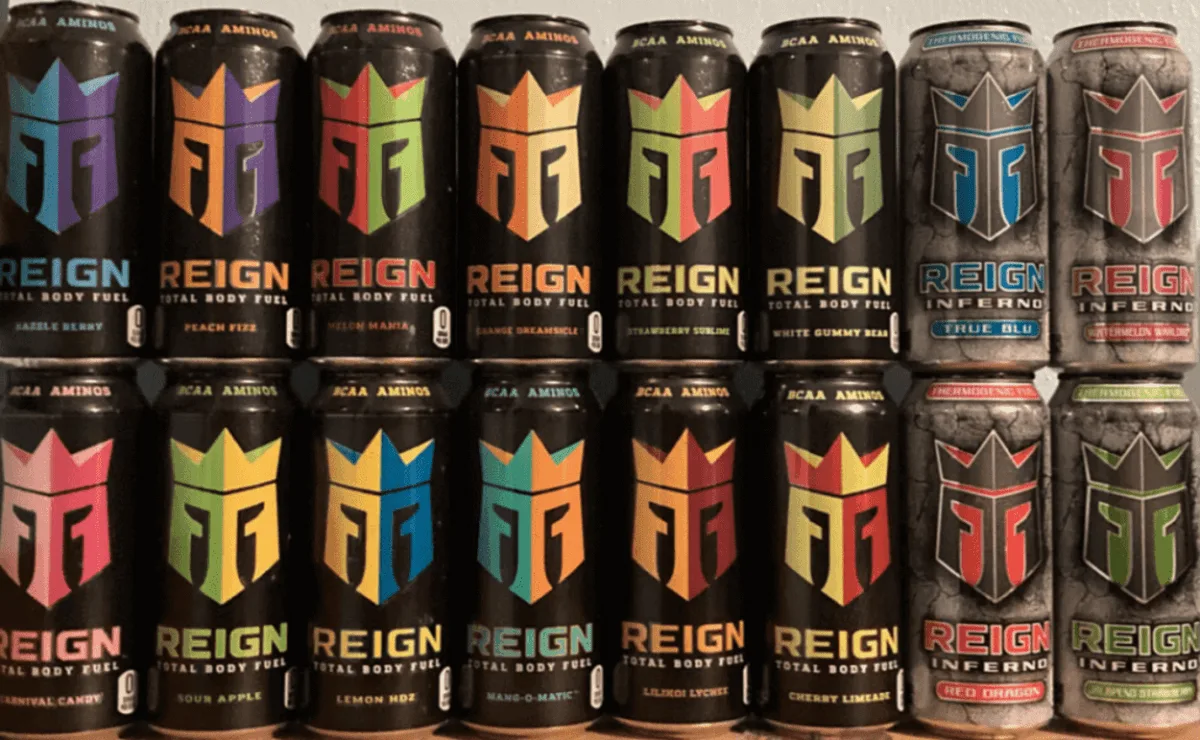
At 300mg of caffeine per serving, Reign’s caffeine contet is definitely high enough to give you the energy boost you crave.
Bang has BCAA content (Branch Chained Amino Acid) which is known to increase muscle growth, improve physical performance, and reduce exercise-induced fatigue.
In every 16 fl.oz serving of Reign, you get zero to 10 calories depending on the flavor you’d choose to drink.
So, if you live a healthy and active lifestyle, Regin is a pretty great contender against other energy drinks present in the market.
Want to find out whether Reign or Bang might be the preferable option for you? Do have a look at my Reign VS Bang article, to see which of these two heavily caffeinated energy drinks stand out as the better option.
Final Thoughts
Energy drinks are a great choice before working out. It offers vitamins and benefits that can aid you before your exercise. Just make sure that you bring extra water with you for maximum hydration as energy drinks tend to increase dehydration.
Energy drinks aren’t only known to boost energy but also, it can enhance cognitive functions which is necessary for workout.
But always remember to keep your energy drinks intake in moderation. Energy drinks may be packed with vitamins and nutritional supplements but overconsumption may result to detrimental side effects.
